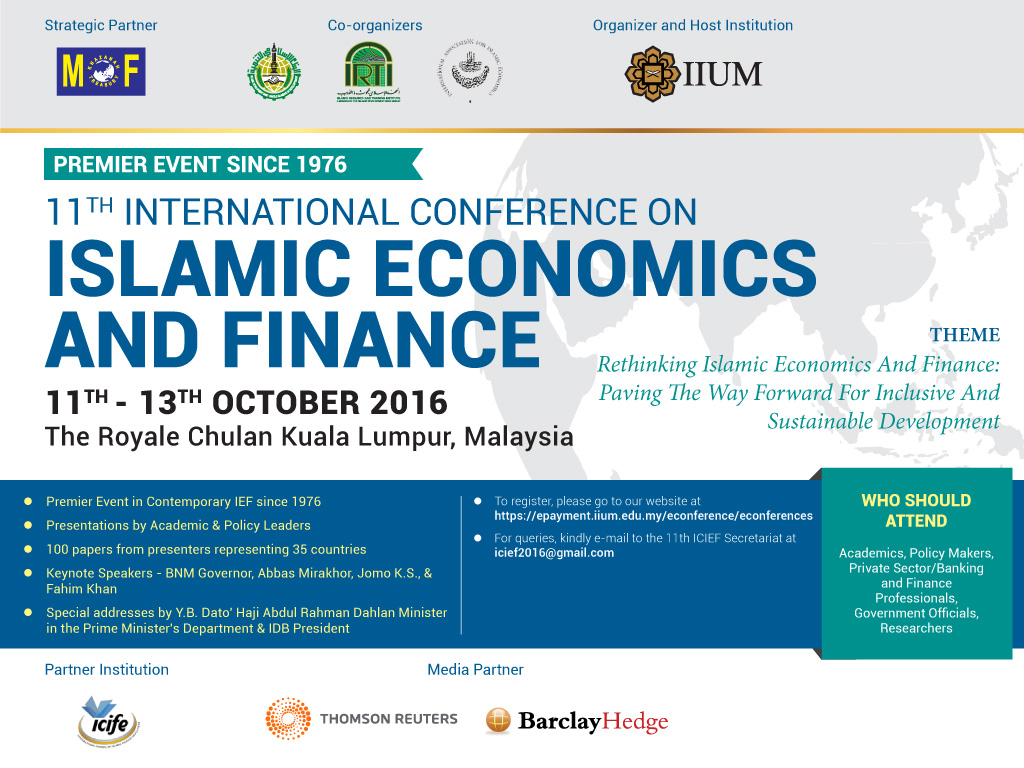
I. INTRODUCTION
The First International Conference on Islamic Economics held in Makkah al-Mukarramah in 1976, was the watershed for the new discipline of ‘Islamic economics’. Ten conferences have been held so far in this series. As we approach the 40th anniversary of the series, after the 3rd International Conference in 1992 the Kulliyyah of Economics and Management Sciences (KENMS) of the International Islamic University Malaysia (IIUM), is once again honoured to manage and host the 11th International Conference on Islamic Economics and Finance, tentatively during Tuesday 11th – Thursday 13th October 2016 in Kuala Lumpur. The theme of the conference is: Rethinking Islamic Economics and Finance: Paving the Way Forward for Inclusive and Sustainable Development.
With the world struggling to recover from increasingly frequent financial and economic crises, the OIC countries have the opportunity to embrace Islamic economics and finance and related areas as indigenous approaches to guide their economic policy responses. However, for this to meaningfully happen, theoretical foundations of both Islamic economics and finance, as well as their links to policy making and implementation need to be given greater attention and integration. The 11th ICIEF 2016 provides the platform for bringing together academics, researchers and policymakers from all over the world to discuss how greater effort can be made in this direction.
- For information and access to previous ICIEF, visit http://conference.qfis.edu.qa/
II. OBJECTIVES
The teaching, research and practice of Islamic economics and finance have made tremendous strides globally over the last 40 years. The establishment of higher education institutions like the IIUM and development finance institutions like the IDB, respectively, have provided important avenues for practical implementation of education programs as well as increasing financing for economic and financial cooperation among the OIC-member countries. Development of research and practice of Islamic economics and finance requires commitment by all the stakeholders as well as establishment of viable links between theory and policymaking by the policymakers.
Taking into account the state of the art and the direction of the fields of Islamic economics and finance, the 11th ICIEF focuses on the way forward toward developing the disciplines of Islamic economics and Islamic finance and increasing their application in the economies of the OIC and non-OIC countries. Hence, the conference is devoted to not only theory development and application of the theory but also policy-related issues concerning, but not necessarily limited to, the following three major areas: Islamic Economics, Islamic Finance, Policy-related areas in Economics, Finance, Accounting, Management and Marketing.
1. Islamic Economics– Islamic economic system and Islamic economy; critical review of theoretical and policy studies dealing with the development of Islamic economics; comparative studies of the foundations and structure of existing economies as compared to the Islamic economic model; Islamic economic theory; applied Islamic economics; review articles useful as teaching materials at the university level
2. Policy Issues confronting the OIC and non-OIC countries and practicable Islamic economic solutions – poverty and income distribution; entrepreneurship development and financial services for micro and medium-sized enterprises; role of Muslim women in the economy; existing legal, tax and regulatory framework from the Islamic economics perspective; Islamic monetary policy and issues; use of zakah- and awqaf-based social safety-nets in Muslim countries; economic indebtedness of the OIC countries; role of Islamic Development Bank in the economic development of the OIC countries
3. Islamic Finance– emerging issues relating to Islamic finance; alternative financial and monetary systems from the Islamic perspective; stability of Islamic financial system; risk-sharing in Islamic finance; Islamic response to regional/global economic and financial crises
4. Other Related Areas – the Shari’ah and its relation to Islamic economics and finance; Shari’ah-based economic policy; issues relating to Islamic accounting theory and its application to Islamic economics and finance; Islamic approaches to management and marketing; Islamic economics education and research; Islamic finance education and research
(Click here for more details of the sub-themes)
**Registration and Submission
Registration and submission Full Paper must be done electronically through the online submission system.
- STEP 1 : Click on the "Registration" menu to create ConfBay Account and proceed for conference registration by logging in the system.
- STEP 2 : Click on "Online Submission" menu to submit your abstracts / full paper.
- STEP 3 : Strictly follow the Submission Guidelines which can be downloaded from the "Download" menu
